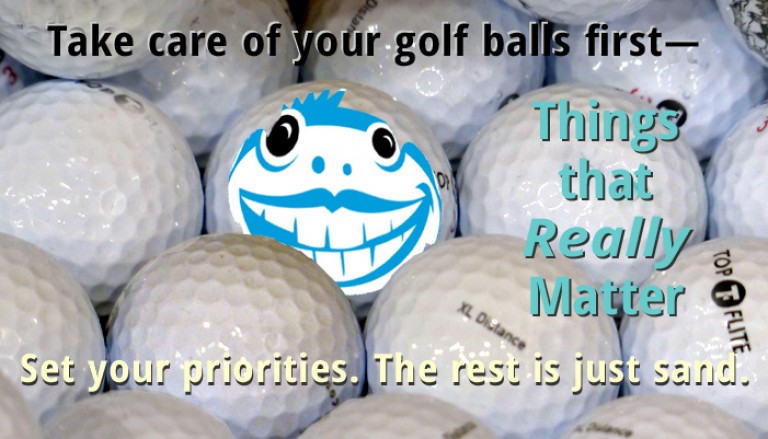
Do you have more “room” in your life than you think?
Often I’ll hear from a client or colleague that he or she is so busy running the business that there’s positively no time left in the schedule to engage in marketing, social media, and other business development activities—let alone have a life and enjoy family or a little “me” time (so much for work-life balance).
Let’s face it: we’re all super busy—at least we feel as though we are. That’s a fact. When asked, “Are you busy?” there’s probably not one of us who would say “no.” We all lead active lifestyles. We work hard. We play hard. There’s always something to do—whether it’s to pay some bills, do the household chores, wash the car, mow the lawn, meet with clients or prospects, engage in some creative or business development time, bring the family out for an ice cream, veg out in front of the TV screen, or (lest we forget) make some money!
Of course, feeling busy and actually being busy (let alone being productively busy) can be worlds apart. I’d hazard a guess that most of us, including yours truly, might be quite busy—but not as productively busy as we think we are. In other words, we’re filling our personal and professional schedules with “stuff” to do, but not necessarily the right stuff—the stuff that’s most important to our happiness and to our success.
To illustrate, let’s revisit the well-known story of the professor and his seemingly “full” jar:
A professor stood before his philosophy class and had some items in front of him. When the class began, he wordlessly picked up a very large and empty mayonnaise jar and proceeded to fill it with golf balls. He then asked the students if the jar was full. They agreed that it was.
The professor then picked up a box of pebbles and poured them into the jar. He shook the jar lightly. The pebbles rolled into the open areas between the golf balls. He then asked the students again if the jar was full. They agreed it was.
The professor next picked up a box of sand and poured it into the jar. Of course, the sand filled the spaces between the balls and the pebbles. He asked once more if the jar was full. The students responded with a unanimous “yes.”
The professor then produced two beers from under the table and poured their entire contents into the jar, effectively filling the remaining empty space. The students laughed.
“Now,” said the professor as the laughter subsided, “I want you to recognize that this jar represents your life. The golf balls are the important things—your family, your children, your health, your friends and your favorite passions—and if everything else was lost and only they remained, your life would still be full. The pebbles are the other things that matter like your job, your house, and your car. The sand is everything else—the small stuff.
“If you put the sand into the jar first,” he continued, “there is no room for the pebbles or the golf balls. The same goes for life.
“If you spend all your time and energy on the small stuff you will never have room for the things that are important to you. Pay attention to the things that are critical to your happiness. Spend time with your children. Spend time with your parents. Visit with grandparents. Take your spouse out to dinner. Play another 18. There will always be time to clean the house and mow the lawn.
“Take care of the golf balls first—the things that really matter. Set your priorities. The rest is just sand.”
One of the students raised her hand and inquired what the beer represented.
The professor smiled and said, “I’m glad you asked. The beer just shows you that no matter how full your life may seem, there’s always room for a couple of beers with a friend.”
Happy Gilmore Knows Golf. Enjoy.
Take a look at your life.
On a personal level, do you fill your days full of “the small stuff” without leaving time for the “big stuff” (the golf balls in your life)?
What about your professional life? How do you spend your time there? Do you spend your days engaged in activities designed to make money or further your career, or do you engage in administrative tasks and busy-work—dealing with minutia that makes you feel busy, but has no real impact on your bottom line?
Studies of successful small business owners and entrepreneurs reveal that the amount of time they spend on marketing activities (which includes networking, social media, content marketing, advertising, etc.) is between 60% for established businesses and 90% for start-ups. How does this compare to where you are spending your time?
What might your business success or career look like if you were to fill your jar with marketing and business development golf balls designed to tell your brand story and boost your business?
Too often, entrepreneurs and small business owners get so overwhelmed by the small stuff that they lose focus on what really matters to their businesses most: building awareness, generating brand “buzz,” and building customer loyalty. One way to jumpstart your understanding of how to make more out of the time you spend on your social media efforts, is to get my Barrel O’Monkeyz social media white paper; it’s full of ideas and resources you can use right away.
In the meantime, I know a certain King Monkey who’s always up “for a couple of beers with a friend” to explore business building ideas. Let’s talk. Cheers!
Paul June is King Monkey of BARREL O’MONKEYZ, a full-service digital media and marketing group specializing in more creativity, ideas, and fun for action sports marketing, sportswear marketing, sports product marketing, active lifestyle consumer products, health product marketing, and brands in San Diego and Southern California.

